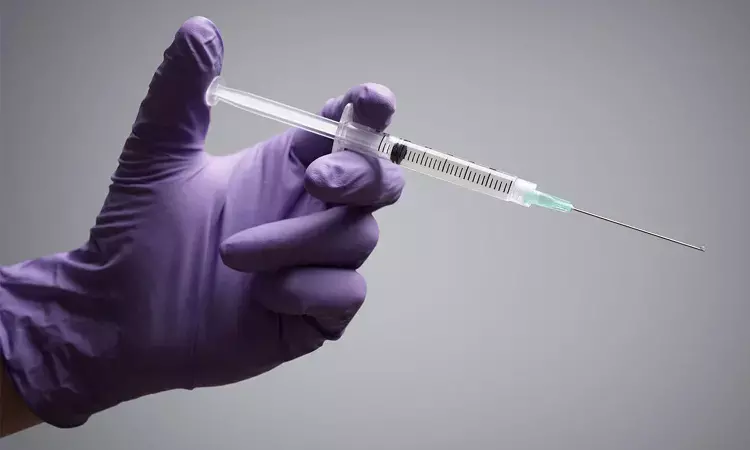- Home
- Medical news & Guidelines
- Anesthesiology
- Cardiology and CTVS
- Critical Care
- Dentistry
- Dermatology
- Diabetes and Endocrinology
- ENT
- Gastroenterology
- Medicine
- Nephrology
- Neurology
- Obstretics-Gynaecology
- Oncology
- Ophthalmology
- Orthopaedics
- Pediatrics-Neonatology
- Psychiatry
- Pulmonology
- Radiology
- Surgery
- Urology
- Laboratory Medicine
- Diet
- Nursing
- Paramedical
- Physiotherapy
- Health news
- Fact Check
- Bone Health Fact Check
- Brain Health Fact Check
- Cancer Related Fact Check
- Child Care Fact Check
- Dental and oral health fact check
- Diabetes and metabolic health fact check
- Diet and Nutrition Fact Check
- Eye and ENT Care Fact Check
- Fitness fact check
- Gut health fact check
- Heart health fact check
- Kidney health fact check
- Medical education fact check
- Men's health fact check
- Respiratory fact check
- Skin and hair care fact check
- Vaccine and Immunization fact check
- Women's health fact check
- AYUSH
- State News
- Andaman and Nicobar Islands
- Andhra Pradesh
- Arunachal Pradesh
- Assam
- Bihar
- Chandigarh
- Chattisgarh
- Dadra and Nagar Haveli
- Daman and Diu
- Delhi
- Goa
- Gujarat
- Haryana
- Himachal Pradesh
- Jammu & Kashmir
- Jharkhand
- Karnataka
- Kerala
- Ladakh
- Lakshadweep
- Madhya Pradesh
- Maharashtra
- Manipur
- Meghalaya
- Mizoram
- Nagaland
- Odisha
- Puducherry
- Punjab
- Rajasthan
- Sikkim
- Tamil Nadu
- Telangana
- Tripura
- Uttar Pradesh
- Uttrakhand
- West Bengal
- Medical Education
- Industry
Articaine and lidocaine safe combo for mandibular third-molar extractions

Dental professionals have recently found that the use of both articaine and lidocaine injections is recommended in the surgical extraction of the mandibular third molar to reduce postoperative complications, according to the study published in the Journal of Dental Anesthesia and Pain Medicine.
Third molar surgery is one of the most common procedures performed by oral and maxillofacial surgeons and general dentists. Complications following impacted third molar surgery significantly affect patients' quality of life during the immediate postoperative period. Therefore, Amin Naghipour and colleagues from the Student Research Committee, School of Dentistry, Semnan University of Medical Sciences, Semnan, Iran carried out this study basically aimed to achieve the proper anesthesia method by comparing the effect of the application of lidocaine alone with the application of lidocaine and articaine simultaneously in reducing the complications during and following impacted mandibular third molar surgery.
The researchers conducted a split-mouth double-blind randomized clinical trial on 13 patients (26 samples) who were referred for elective surgical removal of bilateral impacted mandibular third molar with similar difficulty on both sides. Each patient was advised to undergo similar surgical procedures on two separate appointments.
The total sample size was divided into 2 groups: Group A where each patient randomly received 2% lidocaine for conventional inferior alveolar nerve block and 4% articaine for local infiltration before the surgery on one side and Group B was where each patient received 2% lidocaine alone (for both block anesthesia and infiltration) before the surgery on the other side. Intraoperative and postoperative variables for both groups were established and statistically analyzed.
The authors noted that the findings showed that pain on the first day after surgery in group A was significantly lower than that in group B. Also, the patients in group A mentioned experiencing less discomfort following the surgery. The increased horizontal swelling on the first- and third-days following surgery and oblique swelling on the seventh day in patients in group B were statistically significant.
Therefore, they concluded that "administering articaine and lidocaine simultaneously may lead to less pain on the day following surgery of impacted third molar. This combination of LAs may also influence the postoperative edema experienced on the first, third day, and the seventh day after surgery. Choosing an appropriate anesthetic drug for oral surgery specifically impacted third molar surgery, is dependent on the clinician's opinion, however; it seems that the combination of lidocaine and articaine may control the patient's pain significantly better than lidocaine alone."
Dr. Nandita Mohan is a practicing pediatric dentist with more than 5 years of clinical work experience. Along with this, she is equally interested in keeping herself up to date about the latest developments in the field of medicine and dentistry which is the driving force for her to be in association with Medical Dialogues. She also has her name attached with many publications; both national and international. She has pursued her BDS from Rajiv Gandhi University of Health Sciences, Bangalore and later went to enter her dream specialty (MDS) in the Department of Pedodontics and Preventive Dentistry from Pt. B.D. Sharma University of Health Sciences. Through all the years of experience, her core interest in learning something new has never stopped. She can be contacted at editorial@medicaldialogues.in. Contact no. 011-43720751
Dr Kamal Kant Kohli-MBBS, DTCD- a chest specialist with more than 30 years of practice and a flair for writing clinical articles, Dr Kamal Kant Kohli joined Medical Dialogues as a Chief Editor of Medical News. Besides writing articles, as an editor, he proofreads and verifies all the medical content published on Medical Dialogues including those coming from journals, studies,medical conferences,guidelines etc. Email: drkohli@medicaldialogues.in. Contact no. 011-43720751


